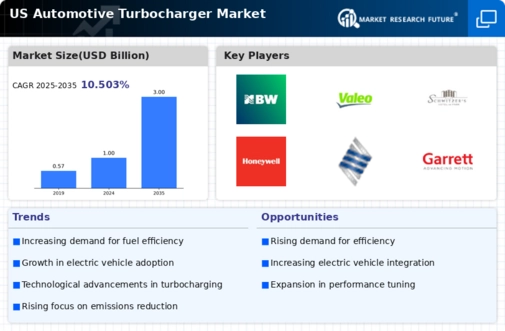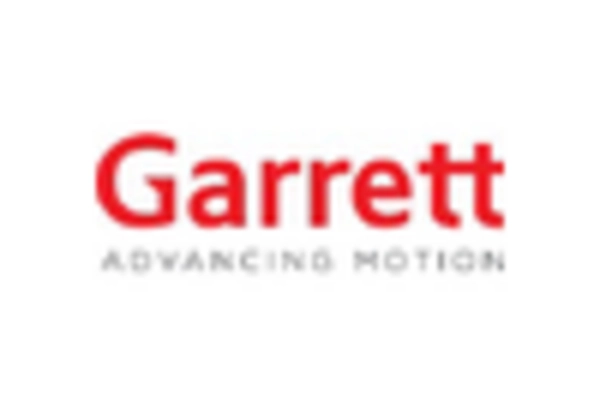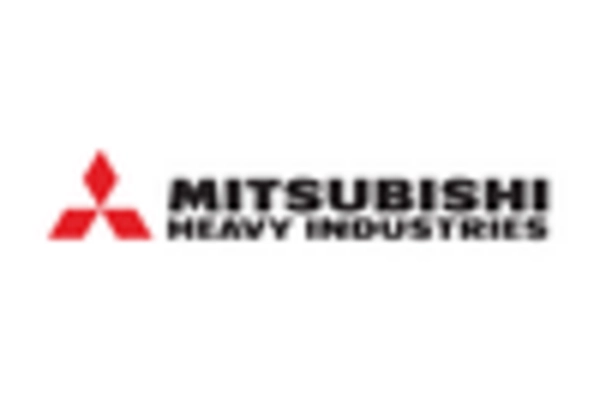Rising Demand for Fuel Efficiency
The automotive turbocharger market experiences a notable surge in demand driven by the increasing consumer preference for fuel-efficient vehicles. As fuel prices remain volatile, consumers are gravitating towards technologies that enhance fuel economy. Turbochargers, by improving engine efficiency, allow smaller engines to deliver higher power outputs without compromising on fuel consumption. In the US, the automotive sector has seen a shift, with turbocharged vehicles accounting for approximately 30% of new car sales in 2025. This trend indicates a growing acceptance of turbocharging technology. It is likely to continue as manufacturers strive to meet consumer expectations for performance and efficiency. Consequently, the automotive turbocharger market is poised for growth as automakers integrate these systems into their designs to attract environmentally conscious consumers.
Increased Performance Expectations
The automotive turbocharger market is significantly influenced by the rising performance expectations of consumers. As automotive technology evolves, drivers are increasingly seeking vehicles that offer enhanced acceleration and power without sacrificing fuel efficiency. Turbochargers play a crucial role in meeting these demands by enabling smaller engines to produce more power. In 2025, it is estimated that nearly 40% of new vehicles sold in the US will be equipped with turbocharged engines, reflecting a shift towards performance-oriented designs. This trend suggests that manufacturers are likely to invest more in turbocharging technology to satisfy consumer desires for high-performance vehicles. As a result, the automotive turbocharger market is expected to expand, driven by the need for improved engine performance across various vehicle segments.
Consumer Awareness of Environmental Impact
Consumer awareness regarding the environmental impact of vehicles is a driving force in the automotive turbocharger market. As more individuals become conscious of their carbon footprint, there is a growing preference for vehicles that utilize technologies promoting sustainability. Turbochargers contribute to this trend by enabling smaller, more efficient engines that produce fewer emissions. In 2025, surveys indicate that approximately 70% of consumers consider fuel efficiency and emissions when purchasing a vehicle, highlighting the importance of eco-friendly technologies. This shift in consumer behavior suggests that the automotive turbocharger market will likely see increased demand as manufacturers respond to the call for greener alternatives in their vehicle offerings.
Technological Innovations in Turbocharging
Technological innovations are reshaping the automotive turbocharger market, as manufacturers continuously seek to enhance the efficiency and effectiveness of turbocharging systems. Advances such as variable geometry turbochargers and twin-scroll designs are becoming increasingly prevalent, allowing for better performance across a wider range of engine speeds. These innovations not only improve power output but also reduce turbo lag, enhancing the overall driving experience. In 2025, the market for advanced turbocharging technologies is projected to grow by approximately 15%, driven by the demand for more responsive and efficient engines. This growth indicates that the automotive turbocharger market is likely to benefit from ongoing research and development efforts aimed at optimizing turbocharger performance and integration within modern vehicles.
Regulatory Pressures for Emission Reductions
Regulatory pressures aimed at reducing vehicle emissions significantly impact the automotive turbocharger market. In the US, stringent emission standards are compelling manufacturers to adopt technologies that minimize environmental impact. Turbochargers are increasingly recognized as effective solutions for meeting these regulations, as they enable engines to produce lower emissions while maintaining performance. As of 2025, it is anticipated that over 50% of new vehicles will be required to meet enhanced emission standards, further driving the adoption of turbocharging technology. This regulatory landscape suggests that the automotive turbocharger market will continue to expand as manufacturers seek to comply with environmental regulations while delivering high-performance vehicles.
















